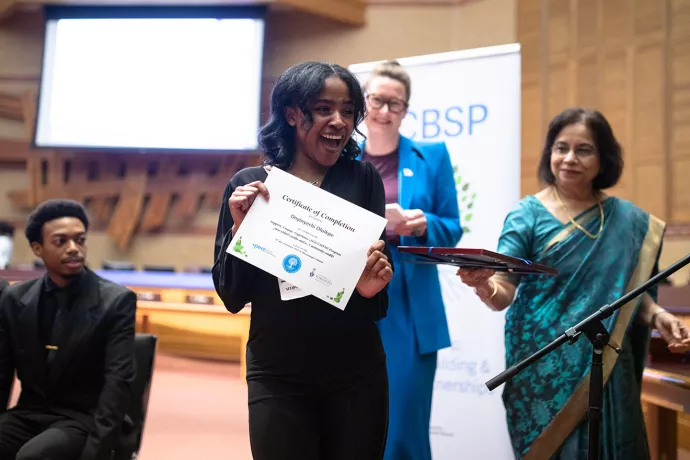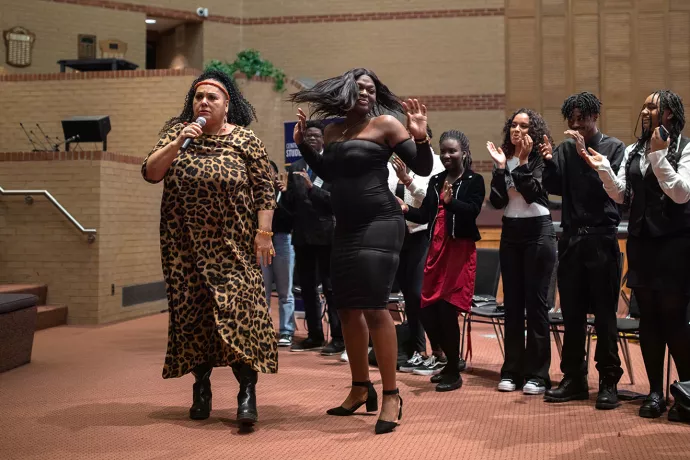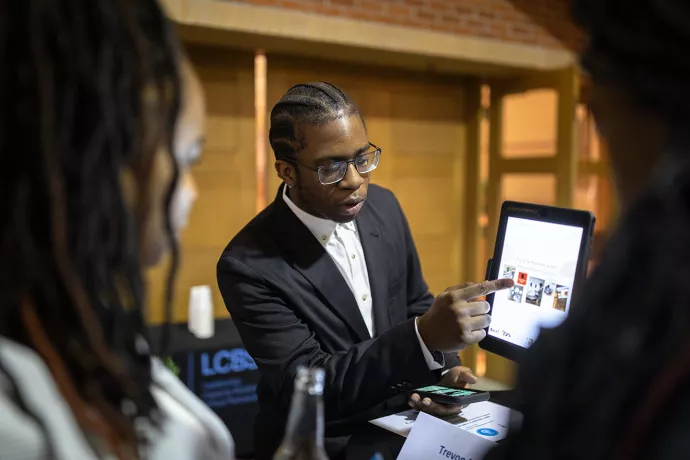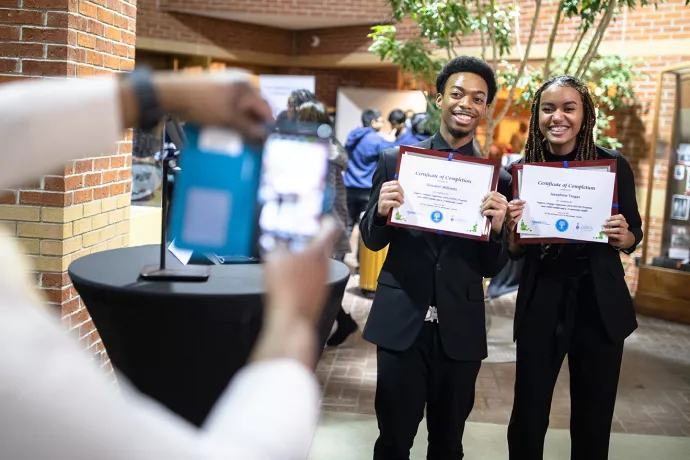Dismantling barriers: High school students experience UTM through program for Black youths

“Eye opening.”
“We can do anything we put our mind to.”
“We’re not alone…we have support.”
“I can do this.”
These are the ways Abby-Gayle Isadora Allen and Trevon Nwaozor describe their experiences as new U of T Mississauga students. They echo sentiments common among first-year students: discovering they have the inner and outer resources to navigate a more challenging academic landscape.
But Allen and Nwaozor aren’t your typical UTM students. Rather, they’re seniors in high school who were part of Support, Engage, Experience University of Toronto Mississauga, an innovative program that makes university education more accessible to Black youths, who are underrepresented at Canada’s post-secondary schools. Developed together with the Peel District School Board and piloted this past fall, it allowed grades 11 and 12 students to earn a university half credit and two Ontario Secondary School Diploma credits, have a co-op experience and be mentored by a senior UTM undergraduate student while simultaneously completing their high school semester.

“The goal is for these students to not only experience the institution, but to see that they are capable of learning here,” says program co-facilitator Jessica Silver, director, student engagement in the Centre for Student Engagement. “When we talk about access, we’re actually talking about the ability to change someone’s ability to attend post-secondary…changing the trajectory of their life.”
Changing the life path of such youth is critical to advancing equity in a society where persistent racial discrimination and systemic socioeconomic barriers continue to adversely affect the participation of Black Canadians in higher education. Statistics Canada data shows that Black youth are less likely than their counterparts to have a postsecondary certificate, diploma or degree.
To help address this disparity and diversity its student body, U of T introduced in May 2019 the inaugural version of this access program, SEE U of T, in collaboration with the Toronto District School Board. Operating at Woodsworth College at the St. George Campus, the program has served multiple cohorts of senior students from two high schools in the city. Keen to apply the program at UTM and build on the campus’s existing efforts to smooth the pathway to university for Black high school students, Silver partnered with Emily Mancuso in Student Recruitment & Admissions to create a customized version for UTM that includes a dedicated academic advisor and the co-operation of numerous campus units.
“UTM is committed to inclusion and ensuring we’re providing access to Black students in their pursuit of post-secondary education,” says Mancuso, associate registrar and director. “We’re dedicated to dismantling barriers that hold anyone from reaching their full potential.”

Allen and Nwaozor were among 22 participants from Fletcher’s Meadow Secondary School and Meadowvale Secondary School who participated in the pilot program, which wraps up next week. The Peel school board provided them access to public transit fare or a chartered bus, and money to buy lunch on campus. UTM, meanwhile, provided an enriching experience of academic and campus life with wraparound supports.
The students took part in the interdisciplinary foundations course Critical Thinking for STEM Learning through the Institute for the Study of University Pedagogy—with UTM covering tuition and book fees—where they learned how STEM subjects intersect with society, history, politics, equity, environment and culture. To help them with their studies, they could turn to their mentor, their teaching assistant or a facilitated study group.
“You learn how to manage your workload…and how to communicate if you’re falling behind,” Allen says.
For her co-op placement, Allen served as a program assistant in the Centre for Student Engagement, where she was involved in analyzing the SEE UTM program, conducting research and identifying ways to improve future iterations. Meanwhile, Nwaozor’s placement aligned with his interests in social justice and political science: as a programming assistant in the Equity, Diversity and Inclusion Office, he helped identify gaps in inclusion on campus, and contributed a post to the office’s Twitter account on Martin Luther King Day.
“It gave me a glimpse of what it could look like to work on campus while being at school,” Nwaozor says.
UTM offered the students workshops in areas such as discovering your strengths, managing personal finances, and adapting to the post-secondary environment. They were also exposed to UTM’s wide range of services and facilities, and provided a student card to use across campus.
One of the most meaningful aspects of the program for Allen and Nwaozor was the one-on-one mentoring they each received from a third- or fourth-year UTM student. Over 20 hours spread across bi-weekly half-hour sessions, they were able to learn first-hand about the highlights and challenges of being a student at UTM.
“It’s almost like having an older sibling…they support you and give you ideas and tips,” Allen says.

Tobi Mohammed was a mentor in the SEE UTM program as well as the teaching assistant for their course. The fourth-year biology for health sciences student helped them tackle skills such as time management, learning how to apply to university and creating LinkedIn profiles.
She says that as someone who is Black, she wishes she could have been part of such a program upon entering university. Helping other Black youths navigate university is inherently rewarding, she says, and her way of helping to make higher education more inclusive.
“We talked about their ambitions and goals, their personal struggles…we talked about everything. We cried together,” Mohammed says. “I get to help set these students up for success…while helping to diversify post-secondary education.”



